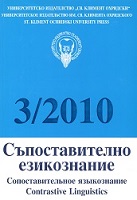За класификацията на глаголните предикати с комплементиран инфинитив въз основа на синтактическите им характеристики и поведение (върху материал от немски и от други сродни езици)
Classifying verbal predicates with complemented infinitives with a view to their syntactic properties and behaviour (on material from German and other related languages)
Author(s): Emilia DenchevaSubject(s): Language studies, Language and Literature Studies, Syntax, Philology
Published by: Софийски университет »Св. Климент Охридски«
Keywords: German language; verbal predicates; complemented infinitives; syntax;
Summary/Abstract: Most infinitival subordinate clauses (constructions) are functionally and semantically equivalent to finite subordinate clauses. Thus in German finite complements introduced by the conjunctions dass ‘that’, ohne dass ‘without’, anstatt dass ‘instead of’, damit ‘in order to’ are structural variants of non-finite complements with zu ‘to’ + infinitive, ohne ... zu ‘without to’ + infinitive, anstatt... zu ‘instead of’ + infinitive, urn ... zu ‘in order to’ + infinitive. The article deals with infinitival clauses which are part of the argument structure of the verbal predicate of the main clause or represent an argument predicted by its valency frame. Beyond the scope of this study remain constructions with the status of independent parts of the sentence. In German such constructions are ohne ...zu, anstatt ...zu and um ... zu + infinitive.
Journal: Съпоставително езикознание / Сопоставительное языкознание
- Issue Year: 2010
- Issue No: 3
- Page Range: 5-21
- Page Count: 17
- Language: Bulgarian
- Content File-PDF

